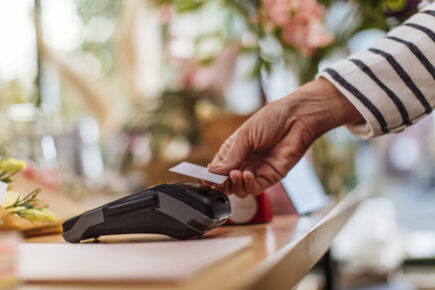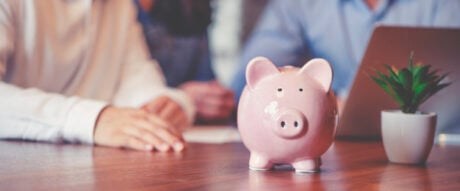Being hit with a large, unexpected expense is never fun. But it can be particularly debilitating if you are young and have minimal savings. Without a financial safety net, reaching for a credit card may feel like the only option.
Roughly one in four (26%) young Canadians (18 to 34 years old) whose credit card habits changed over the past 12 months, say it was because they had to make a major unexpected purchase, according to a new NerdWallet survey conducted by The Harris Poll.
“Credit is neither good nor bad, it just is. How we use it makes it ‘good’ or ‘bad’ in our life,” says Stacy Yanchuk Oleksy, CEO of Credit Counselling Canada, a debt counselling non-profit. “When used wisely, [credit] is a great tool to purchase large items like a home or vehicle. It also adds convenience to our life.”
But, if you lean on them too often, credit cards can create a debt spiral that’s hard to crawl out of. Understanding your options before and after you swipe will help you navigate large, unexpected purchases with greater confidence.
Live within your means
Recent spikes in inflation mean everything is more expensive. Combined with the pressures from social media to live a life that isn’t always feasible, young Canadians may struggle to find their financial footing.
“One of the best things that I did for myself in my twenties was make sure that I didn’t live my life according to someone else’s expectations or rules.” says Jessica Moorhouse, an accredited financial counsellor and host of the More Money Podcast.
Kimberley Jensen, a certified financial planner with Sun Life, says “aim for the 50-30-20 rule.” Allocate 50% of your money to things you need, 30% to things you want, and 20% to savings and investments.
If your current income only covers the things you need, you may have to pull back on buying the things you want.
Being stringent with your spending means you can save more, and perhaps less reliant on your credit card when a surprise bill comes through the door.
Build an emergency fund
An emergency fund is cash you can use in, you guessed it, an emergency. It can help you weather the storm of unexpected financial obligations.
“I would encourage putting away a small amount each paycheque until you’ve accumulated three to six months of living expenses,” Jensen says.
If that sounds like a tall order, you can start small — aim for $1,000. A tax refund is a great way to start your emergency fund, Jensen says. You can also put any additional money you earn — like bonuses or side hustle income — towards the fund.
Be mindful of where you keep the money so you can access it quickly. “Emergency funds are best kept in high interest savings accounts where they are not locked in, inaccessible, or subject to market risk and volatility,” Jensen says. Plus, the higher interest rates help your money grow over time, so you can hit your goal amount faster.
Consider alternative payment methods for unexpected needs
“The rule of thumb is [to] cover the cost with the lowest interest option”, Jensen says. Ideally, this would be cash. If you don’t have an emergency fund, selling unwanted property or picking up a side gig could be a way to generate extra money.
You can also look at buy now, pay later plans. These plans are offered by retailers or non-bank lenders, and make it possible to pay for an item over a set period of time.
Alternatively, some credit cards offer instalment plans, which allow you to pay off the purchase over time, at a lower interest rate than if you charged it
Both BNPL and credit card instalment plans typically come with fees — especially if you fail to pay on time. So be mindful of the added cost when considering these services.
What to do if you use a credit card to pay for a large expense
Putting an unexpected expense on a credit card isn’t always avoidable. If you’ve had to do this, and want to pay off the debt quickly, now’s the time for action.
Try to stop using your credit card for new purchases if you can, and move to cash or debit, Moorhouse says. To do this, you’ll need to take a look at your spending habits.
“This may be prioritising credit card repayment over other ‘wants,’ or pausing subscriptions or memberships to free up cash flow that can be put towards the credit card,” Jenson says. She also strongly encourages people to pay more than the minimum payment, as paying only the minimum barely touches the principal and can drown you with high interest.
Even so, credit card debt can be distressing and clearing the balance may feel impossible. If this sounds like you, there is free help available.
You can reach out to a local non-profit credit counselling agency and meet with an Accredited Financial Counsellor, who will give you options on how to deal with the debt, says Oleksy. “[You] will walk away with a budget, an action plan, referrals to resources in the community, if required. This is a free service for anyone in Canada and it has no impact on a person’s credit score.”
Survey Methodology
This survey was conducted online by The Harris Poll on behalf of NerdWallet from April 3-5, 2023, among 1,025 Canadian adults ages 18 and older. The sampling precision of Harris online polls is measured by using a Bayesian credible interval. For this study, the sample data is accurate to within +/- 3.8 percentage points using a 95% confidence level. For complete survey methodology, including weighting variables and subgroup sample sizes, please contact Mauricio Guitron at [email protected].

2023 Canadian Consumer Credit Card Report
Canadians are taking on credit card debt to make essential purchases as inflation drives prices higher.

7 Ways To Pay Off Credit Card Debt
Paying off your credit card balance should be a straightforward process, but it’s not always so simple. Whether you’re in credit card debt or don’t like carrying a balance, there are a few tips and suggestions you can follow to ensure you stay on track.

Why Are Emergency Funds Important?
You’ve probably heard it all before: “Save your money for a rainy day.” Of course, it’s not a rainy day you need to be concerned about, but a genuine emergency such as a job loss, illness, or any crisis that affects your finances. After all, with more than half of Canadians living paycheque to paycheque, […]

8 Boring-but-Brilliant Uses for Your Tax Refund
Is your 2021 tax refund burning a hole in your pocket? Or maybe this year’s refund is already spent, but you’re feeling regret about how you used it. While it’s fun to splurge a tax refund on something fun, like a vacation or shopping spree, there are some more strategic — OK, boring — uses […]
